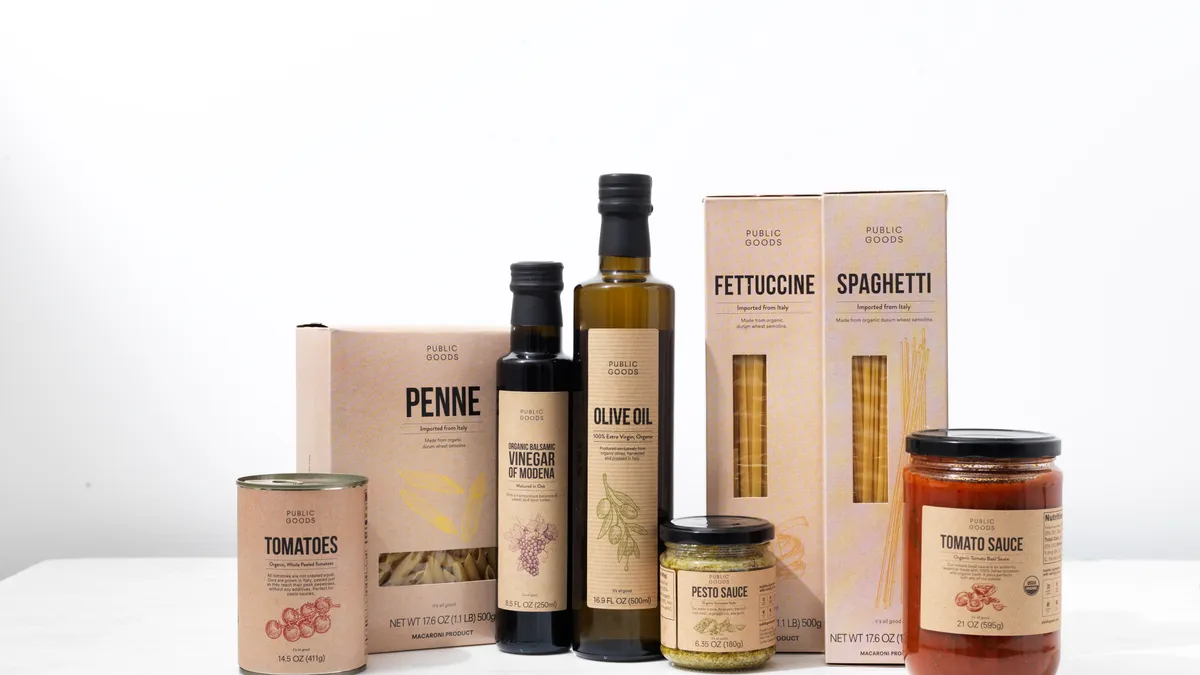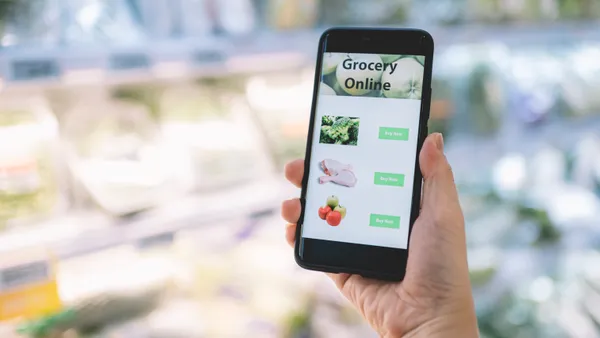Dive Brief:
- Brooklyn-based D2C e-tailer Public Goods (formerly Morgans) started offering organic foods, in addition to its "clean" personal care products and ethically sourced goods, at what it describes as drastically low prices. Membership costs $59 per year and items are sold at cost. New consumers can use a 30-day free trial.
- Launched in 2015 as a personal care products company, the business now offers 60 organic products, including everything from split pea soup to olive oil to fancy baked goods. The e-tailer will feature new goods such as granola, pasta and jams each week.
- Company CEO Morgan Hirsh is hoping to compete with other health segment heavy hitters like Sprouts, Whole Foods, and Trader Joe’s by offering responsibly sourced and organic products while catering to an audience beyond coastal elites. It’s targeting sustainably minded consumers with things like sugar cane-based packaging and offering a zero-waste category, while also organizing items by dietary needs like vegan, gluten-free or vegetarian.
Dive Insight:
Public Goods is cutting out distributors, storefronts, and other middlemen to offer a selection of items at cost with the hopes of attracting price-conscious consumers who don’t want to visit countless different websites to score quality products. An online-only platform also helps the business save on things like marketing, employee paychecks, rental space, and having to hike prices just to meet a minimum margin. It’s also likely trying to cash in on the fact that 62% of U.S. consumers who have internet access report shopping online at least once per month, a figure that climbs to 80% if they also use their phones to surf the web.
With everyone from The Honest Company to BarkBox offering products online, consumers may feel flustered by the staggering number of options that boast utmost quality and affordability. Public Goods’ website and products have a similar feel to Brandless when it comes to marketing and packaging, allowing each item to speak for itself instead of being draped in brand-heavy images or messaging. For many folks, a stripped-down branding platform translates to cheaper products as shoppers assume the company isn’t trying to recapture marketing dollars in its margins.
Despite the pros of online-only business, e-tailers face a serious challenge when it comes to consumers’ inability to feel, see or interact with products before deciding whether to make a purchase. High shipping costs for cold-storage products and a lack of human interaction are other factors dissuading food shoppers from ordering online.
D2C outlets are finding ways to combat these hurdles, such as clothing retailer ThirdLove’s “Try before you buy” program that lets users receive clothing before deciding whether to make a purchase. Casper and other online mattress retailers have boosted sales by simplifying product choices and by offering a 100% money-back guarantee.
Public Goods’ 30-day free trial is an effective way to lure shoppers who may be on the fence about forking over $59 without knowing how often they’ll place an order during the year. Competitor D2C e-tailer Thrive Market requires a $59.95 membership fee, while similar service Boxed does not. Public Goods’ product offerings may not be diverse enough at this stage to compete with Thrive Market and Boxed, however. Each of those businesses has been in the D2C e-tailer food space for a number of years.
Many online-only companies are also tapping social media marketing to push products that shoppers can’t touch by giving them context in lifestyle-focused content. Beauty product line Glossier is a good example, claiming a pool of 1.7 million micro-influencers to drive company growth. Public Goods’ Instagram account is following suit by sharing images of its products in action to its 34,000 followers, with each shot evoking the brand’s focus on quality and sustainability.












